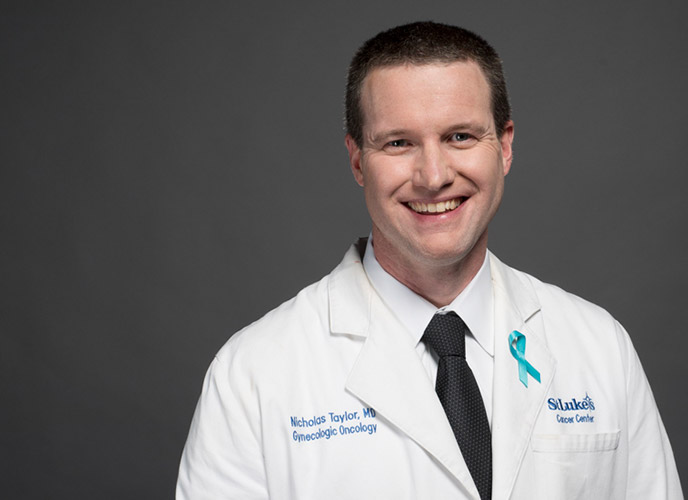Dr. Taylor’s patients describe him in one word: caring. Aside from being a skilled surgeon and knowledgeable oncologist, he treats every patient like family. “They touch my life as much as I hope I touch theirs,” he says.
Most people don’t even remember their high school’s motto let alone live by its credo. But Nicholas Taylor, MD isn’t most people. His high school’s motto was “not to be served, but to serve” and he strives to live by that sentiment each and every day as a cancer doctor with St. Luke’s Cancer Center.
Dr. Taylor is a fellowship-trained gynecologic oncologist, chairman of oncology and chief of gynecologic oncology for St. Luke’s. He specializes in the care and treatment of women with gynecologic malignancies, including ovarian, endometrial, cervical and uterine cancers.
A Love of Learning
From a very young age, Dr. Taylor was interested in science, but he also enjoyed interacting with people. As he got older, he found that a medical career would be the perfect combination of the two. Since Dr. Taylor was always a big fan of learning, medical school and the years following were exciting because he enjoyed being immersed in something new every day.
“As soon as I started medical school, I knew it was where I wanted to be, but a specialty in gynecology didn’t seem likely early on considering I nearly passed out the first time I saw a live delivery,” recalls Dr. Taylor. “But around the same time, I did a rotation in oncology and observed a gynecologic oncology surgery and I was hooked.” Towards the end of medical school, he was reminded of his “be of service” motto and decided that gynecological oncology was the way to do this - to be there for his patients and to help them heal.
Dr. Taylor earned his medical degree from Jefferson Medical College in Philadelphia and completed his residency at New York Presbyterian Hospital-Columbia campus in New York City. He is certified in obstetrics and gynecology by the American Board of Obstetrics and Gynecology and completed his fellowship in gynecological oncology at Washington University School of Medicine in St. Louis.
Now, as part of St. Luke’s elite cancer team, Dr. Taylor is able to fuse his people skills with his love of science. He studies and utilizes all the latest innovative technology to treat cancer while establishing meaningful bonds with patients and their families. “Treating patients with cancer is like being on a journey with them,” says Dr. Taylor. “We stay with our patients for a long time, from diagnosis through treatment and along the way, they touch my life as much as I hope I touch theirs.”
What Makes St. Luke’s Different
Dr. Taylor practices at St. Luke’s because St. Luke’s values are very much aligned with his own. “We treat patients like people, not numbers,” explains Dr. Taylor. “Our entire team is solely focused on one thing: always doing what is right for the patient. We don’t let politics, finances or other distractions get in the way of that.”
While Dr. Taylor and the entire cancer team stay on top of clinical breakthroughs, advanced treatments and faster, more accurate diagnoses for patients, they are also trusted and compassionate experts who deliver highly personalized care for each individual patient. “In cancer care, it can be difficult to find that perfect balance between leading-edge care and compassion, but at St. Luke’s we live that balance every day,” continues Dr. Taylor. “We do all the same things that any larger, metropolitan hospital does – we offer the same innovative and high-tech treatments, but what makes us unique is how we make the patient feel. We don’t just treat them like family – they are family.”
St. Luke’s participates in numerous clinical trials for all gynecological cancers because clinical trials are such an important part of treatment. “But if we don’t have a trial that fits a particular case, we will find one - what matters most is that we do what’s best for the patient.”
The Importance of Early Detection
Throughout his career, Dr. Taylor has seen his fair share of successful cases and what most have in common is early detection. The most common cancer he treats is uterine (including endometrial cancer) followed by ovarian, cervical and lastly, vulvar. “By the time patients come to me, cancer has already been discovered,” he says. “But when I speak to patients about recurrence or talk to family or friends, I stress the importance of prevention and early detection. Early detection truly can save your life.” Early detection means annual pelvic exams and Pap smears as recommended by your physician. It also means discussing any changes or unusual symptoms, like abnormal vaginal bleeding or discharge, with your doctor, some of which could be early signs of gynecologic cancers.
Cervical cancer, one of the most preventable cancers, is becoming more and more rare because of early detection and the use of the HPV vaccination, which protects against the cancer-causing human papilloma virus. Oral contraceptives have also been shown to reduce the risk of the development of ovarian cancer by 50 percent if used for at least five years.
Striving to Serve Each Day
After Dr. Taylor was practicing for a while, he was able to recognize and process the profound impact he has on patients’ lives. Sadly, he was attending the funeral for a woman who had valiantly battled cancer. “When I approached the patient’s husband to express my condolences, he proceeded to introduce me to the entire family and they all knew who I was,” recalls Dr. Taylor. “Each of them thanked me for taking care of her and for how I treated her. That was powerful. Here they were in their time of grief, thanking me. I couldn’t believe it.”
When Dr. Taylor meets new patients, he acknowledges that cancer is scary, but he also emphasizes that he and his team are there to guide and support them; he always wants them to know they are not alone. “I see so many patients who go about their cancer journey with grace, humor and honor and I have seen firsthand the power of the human spirit,” says Dr. Taylor. “And when I can tell a patient that their treatment is over or they are cancer-free and they can go back to their productive lives, there is no better feeling in the world.” It’s in those moments that Dr. Taylor feels he is truly living his motto “not to be served, but to serve.”




